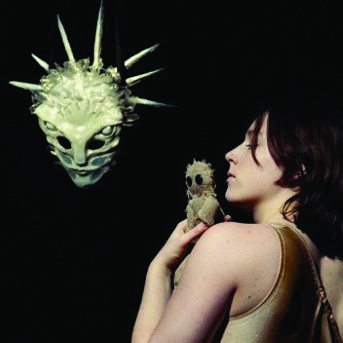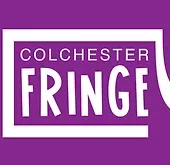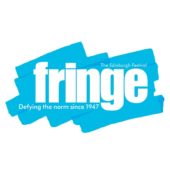
Flora Novak is a Hungarian actress and puppeteer based in Budapest. She premiered at the 2025 Edinburgh Fringe with the object-puppetry show Providence, created and interpreted by her. The show was staged from 30th July to 10th August at C Venues, C Alto. We meet with Flora once again in her hometown of Budapest, one month later. In this interview she shares her experience at the world’s largest theatre festival and what she learnt from it.
You can get more information about Flora Novak and her work by visiting her Instagram profile flora_novak_puppets
Interview by Tom Corradini
TRANSCRIPT OF THE INTERVIEW
Recorded on September 6th in Budapest
INTRODUCTION
Tom: Hello there. We’re here in Budapest for FringeReview. We’re laughing because we had a bad start with the first interview, but anyway, I’m here with Flora Novak, who is the actress and creator of this show that participated in the Edinburgh Fringe Festival, PROVIDENCE. But let’s go straight to Flora. Flora, tell us something about your show.
Flora: So, my show is a solo performance. I do object theater – non-verbal – so it’s completely with just music, but it’s very important in my show. Object theater means that I manipulate and animate everyday objects as they function in everyday life. The dramaturgy in the scene is based on that.
My show is originally a very classical piece – a very well-celebrated Hungarian piece called “The Tragedy of Man” by Imre Madách. It’s an old play written in the 1800s and traditionally it’s performed by a lot of extras, a lot of people, very little music, very long philosophical monologues. And I really love the play itself – it’s obligatory in Hungarian high school, so it’s very well known here. But I never liked the theater adaptations of it. So I was like, okay, let’s do something that I like.
Tom: I saw the play and I didn’t know about the background of the play. But basically, from what I saw, it really is the history of man and Providence starts with the Garden of Eden in a way. It’s a puppetry show, but it’s all silent. It’s nonverbal, so it can be watched by anybody and also has an original score, original music, which accompanies the show, which is, I must say, beautiful. So, you want to tell us something about that?
Flora: I worked with my godfather. He is the composer of my show. He is an old friend of my mother – they did theater together when they were younger. So it’s a great pleasure and great honor to work with him. You can find him on Bandcamp because he retired from all mainstream platforms and he did a one-hour original score with symphonic orchestra. So every scene has a different score.
Tom: Just a second, is that a real orchestra, real people?
Flora: No, it would be really fun though to perform it with a live orchestra, but no, he composed all of it by himself in his room at his home. He also produced the music. So he composed it and produced it and mixed it in his room basically.
Tom: It sounded like it was actually played by an orchestra. That’s why I asked.
Flora: Yeah, because he also produced the music. So he composed it and produced it and mixed it in his room basically.
Tom: Before we ask about your Edinburgh experience, the show – it’s you acting as an actress in the middle of these objects in a way, and especially there’s a puppet who sort of represents mankind. That’s what I understand. Can you just tell us how you were trained or how you got this idea? You told us it’s a classical piece, but I mean you are an actress as well in the play and you also have a very nice mask I must say. So tell us something about the masks. You also use masks in the play.
Flora: Yeah. So as you said, the story starts in the Garden of Eden and the two masks represent God and Lucifer. So basically, as Lucifer is not happy with the creation of mankind. He tries to prove to God that mankind will fail inevitably. So he just puts Adam, this little puppet, through all of the changes of history and kind of just proving that doesn’t matter what new idea you come up with, you will end up failing.
But in the end, Adam finds his way back. In the original piece, actually in the finale that I do, it’s a very famous sentence in the play when Adam is like “okay I woke up from this dream where Lucifer showed me that everything is going down doesn’t matter what I do. So what do I do?” He wants to commit suicide but that never happens because there is no point to that. Eve is already pregnant. So Adam then learns that and he just asks God “Okay what do you want me to do?” and God says “Trust and fight.” So basically that is what you can take away from the play.
Tom: It really is the story of mankind. There’s a section about Egypt, the French revolution and so on. But apart from the show, if you can tell us something about you. You said, as we were speaking about this before, that this was like a final project of your sort of university thesis or whatever it was. I don’t know about the masks because there’s a couple of masks you use – have you made the masks yourself? So tell us about yourself and these masks.
Flora: So I didn’t make the masks. The creative team is one girl who did the masks. I directed and performed everything. My composer and I have an assistant who is also the choreographer. But the masks are made by Míra Ágfay. She already graduated from – I don’t know how to say that in English – so in Hungary we separated the two universities. My university is for performing, directing, dramaturgy, all of that, and there is a different university for people who work with scenery, costumes, puppets, that kind of stuff. So she already graduated from that university.
I study at the University of Theater and Film Arts of Budapest and I study on the acting course with puppet specialization. So that means that I have full acting training but with the extra of learning how to manipulate puppets and different objects.
Actually, I had to do my diploma work earlier because I still have this year and I produced the show last year in the first semester because our headmasters wanted to do it earlier.
The Edinburgh Experience
Tom: Now, let’s move to Edinburgh, which is a bit more busy than Budapest in August, I guess. So how did you – and this is also for other artists, it’s not just about you – but how did you get there? I mean, what was the idea? It’s good to have this interview because we’re past Edinburgh right now. So I think you can reflect on this experience with a bit of detachment. So yeah, just tell us how did you decide to come to Edinburgh? What happened and so on.
Flora: So I knew from the start that I want to make a nonverbal show because I’m really interested in doing an international artistic career and not a lot of people speak Hungarian outside of Hungary. And also it’s a very fun theater language.
So my godfather who composed the music, he was like, “Okay, if you want to get to know more international artists and people, why don’t you go to the Edinburgh fringe?” I never ever heard of that before. It’s not very known in Hungary.
So nobody knew me there. I didn’t have high expectations because I was told that it’s usually you have fewer or basically no audience in the first few weeks because there are a lot of shows and it’s a very big competition basically.
Tom: Sorry if I interrupt you, but you did 12 days, is that correct?
Flora: Yeah. And I also worked as a volunteer at the venues. So because I’m a university student, I don’t have a lot of funding and fringe is really expensive. So that was one of the reasons why I only did a half run because I didn’t have more money to do that and also because I was volunteering so it was a lot of extra work. So performing 12 days in a row is already exhausting, especially with physical and public theater that I do.
Just a little fun fact, I do like 100 squats during the show because I’m just going behind the desk and I’m just putting out all of the stuff.
Tom: There’s like a desk or a table where you lay out your puppets and so on. You do everything. You also act, so that people may understand what happens during the show.
Flora: Yeah. I was really excited. I didn’t know what to expect, but it was a lot. It’s really shocking, but I had a really good experience with the fringe. It was really chaotic and exhausting, but I was really happy at the end. And I had a lot more people than I expected. On the first day, I had already eight people in. I was like, okay, how is it possible? And basically from after the first week I always performed for 10-15 people and in the last two days I had full house. That was really flattering and I was really touched by it because it was a great experience and a great first experience with the fringe. I absolutely plan on going back if I can do that because now I could just do this show one more time. I already built an audience. I have reviews to quote, so I can plan it better because I know what to expect.
Tom: There was a word of mouth effect. The show really deserves a lot I think. It’s a shame you didn’t stay for the whole run, but still Edinburgh is becoming so expensive right now that a lot of companies just do one week or two weeks, so it’s very common. Right now you’re back and all the vibe of Edinburgh settled down and how is it? Going back to normal life? You also told me you were invited to a festival or you got a contact to a festival. So what happened after? I mean how did you feel?
Flora: I felt really tired, really happy and also it was kind of an emptiness afterwards when I came home. The good thing that I didn’t have a lot of time to process and be sad about it. Also, I made a lot of friends in the volunteer group. So it was really hard to let them go for God knows how long.
But because I was contracted for one season, one year in a different city, it’s like 3 hours train ride from Budapest. It’s a puppet theater. So after one week I already started rehearsing. So there was not a lot of free time but it was a good thing.
Tom: One thing that people say, you know, when they do Edinburgh is that the show starts in a way and it ends up differently – it starts as a baby in a way. It’s a show that you’ve done many times and then the very last days of the festival it becomes a different show because of course doing shows so many days in a row kind of changes everything. And I think with a nonverbal show also it’s kind of easier to adapt something or change something whereas if you are bound to the text there’s not that much you can change. So is there anything that happened to the show during these 12 days? Did you see any change?
Flora: Yeah. What bounds me more even though I don’t have text but I have very specific cues with the music. So what happened – I had a lot more routine with doing the show so many times so I could do specific changing things quicker so I had more time to deepen, to perform in a deeper level. So just getting in a deeper sense in it because I was not so stressed to get from A to B because I know that the musical cue is there. And that was really fun because it was a really organic process and I didn’t really plan on doing that. It just kind of happened.
Also, I got a lot more stability and security with the show because everything can happen if you perform for 12 days in a row. Basically on the third performance I got half of my props from Egypt shattered on the ground during the show. That was stressful. My assistant cut his foot during the show with all the remains. So obviously mistakes happen, but now I’m more confident that I can handle everything in it. And it’s really important because I have a lot of props for every scene. I have different set of props. So it’s really stressful to handle all of that perfectly.
Advice and Future Plans
Tom: This is the third and final part of our interview. I’m here with Flora Novak. The show is Providence. Now, you know if you were to go back the second time – some mistakes first of all – experience as Oscar Wilde used to say is a name that we give to our mistakes – so you gained experience. What is it that you would do differently or you would change or something you didn’t do and you kind of discovered it’s important to do?
Flora: I think I would start the marketing sooner or building an audience sooner so people already know about you when you go to the fringe. So I think it’s a lot more prep time. Also, I would take duplicates for different props that are fragile. So it’s not that stressful to replace stuff because mistakes happen and props and costumes get worn off or break if you perform that many times.
And also I would start flyering in the mask sooner. A lot of people try to get an audience through flyering and I saw a lot of people just flyering in normal street wear or even pay people to do that. So flyering while wearing something that really calls for people’s attention – because in the first few days I was just flyering very normally and it didn’t really work. But if I put one of the masks on and just go in the crowd, not speaking a word, just moving very slowly as in character and just handing out the flyers. Also, I really like to scare people in the mask. That also worked. It was really funny.
Tom: So the name of the game is basically catching the attention.
Flora: Yes, it’s very important because a lot of people are just wandering around, don’t know what they want or what they want to watch.
Tom: The marketing – just with what you said and basically just like getting prepared for the fact that you’re going to ruin a lot of stuff. A lot of maintenance is important but also the marketing side is very important. You would start marketing the show much sooner. How about after you finish the fringe? Can you still market after the fringe?
Flora: Actually, I didn’t market after the fringe. I didn’t even think about it because people are there for the second half of the fringe looking for different shows. So I don’t really feel that I have a place to do that because they are not interested. When I mean about after – really after the fringe is finished – I wouldn’t start it as soon as it ends but I think I would start it in like February, March or April maybe. So much earlier, not just during summer.
Tom: So any plans for the future, any new shows apart from the fact that you may want to go back to Edinburgh or anything?
Flora: So the show got invited from the fringe. A director saw it and he invited the show to New York to another festival – Rehearsal for Truth. It’s the festival name for central and eastern European productions. That’s really interesting. That’s going to happen next June.
But for now I don’t really have time to produce another show because I’m working full time in this other company. So we are performing a lot – like now I’m rehearsing but after the premiere I will perform twice a day for six times a week so I don’t really have a lot of free time.
Tom: You’re busy as a bee but that’s good. So thank you very much first of all and lots of luck if you go back another time. I hope to see you again with the show Providence, Flora. Thank you.
Flora: Thank you so much.




























